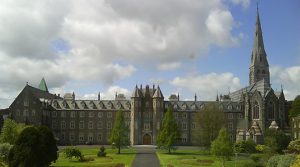
By Sarah Mac Donald - 25 August, 2016

The archbishops and bishops who act as trustees of the national seminary in Maynooth have said they share concerns over the “unhealthy atmosphere” at the college created by anonymous accusations.
In a statement issued on Wednesday, as Maynooth welcomed 14 new seminarians who make up this year’s cohort of trainee priests for the Irish Church, the trustees appealed to those with “specific concerns” to report them “appropriately” as soon as possible.
The Trustees met on Tuesday in Maynooth to discuss the needs of the students and staff in the wake of the furore over allegations of inappropriate behaviour among seminarians including claims that seminarians were using the gay dating app Grindr.
Paying tribute to the “generosity and openness which motivates young men to consider a vocation to the priesthood and to apply themselves to the formation process”, the four archbishops and 11 bishops stressed that the Church has clear instructions on the formation of seminarians.
“There is no place in a seminary community for any sort of behaviour or attitude which contradicts the teaching and example of Jesus Christ.”
They pledged to review current policies and procedures for reporting complaints with a view to adopting best practice procedures for ‘protected disclosures’ (whistle-blowing).
They have also requested the seminary authorities to evaluate and review the policy regarding the appropriate use of the internet and social media;
In a statement on Wednesday, the trustees revealed that they will request the Irish Bishops’ Conference to commission an independent audit and report of governance and statutes in Irish seminaries.
They also want the IBC to progress “urgently” a uniform national policy for admissions to Irish seminaries and begin planning for the introduction of a propaedeutic year (pre-seminary) for all applicants for priestly training.
Another development will see a subcommittee established to examine, with relevant consultors and advisors, the pastoral needs of priestly training in contemporary Ireland.
This subcommittee will heed the recent recommendation of Pope Francis that lay people, families and especially women be present in priestly formation, so as to promote an “appreciation of the diversity and complementarity of the different vocations in the Church”.
The trustees also announced that they will conduct the triennial review of St Patrick’s College, Maynooth, and of the Pontifical Irish College, Rome, in the Spring of 2017.
Contrary to claims made by ex seminarians in recent weeks, the trustees said they are satisfied that seminarians are not asked to sign a confidentiality agreement.
They said they accepted their responsibility for ensuring that the national seminary adheres to best practice in all areas of training for priesthood and that college staff are trained to the highest level in accordance with requisite professional standards and the requirements of the Holy See.
At the beginning of August, Archbishop Diarmuid Martin of Dublin confirmed to The Tablet and the Irish Independent that he was not sending his seminarians to Maynooth for their formation but would send them to the Irish College in Rome.
In an interview with RTE, Archbishop Martin expressed concern over allegations that whistleblowers trying to bring alleged wrongdoing to the attention of authorities were being dismissed from the seminary.